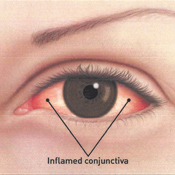
Conjunctivitis is a term used to describe inflammation of the conjunctiva, which is the thin filmy membrane that covers the inside of your eyelids and the white part of your eye (sclera). Conjunctivitis is also referred to as “pink eye”. The conjunctiva contains tiny blood vessels, which produce mucus to coat and lubricate the surface of your eye. When the conjunctiva becomes irritated or inflamed, the blood vessels become larger and more prominent, making the eye appear red. Conjunctivitis can occur in one or both eyes.
SYMPTOMS
- Increased tearing
- Soreness of the eye
- Foreign body sensation
- Itchiness of the eye
- Hazy or blurred vision due to mucus or pus
- Crusting of the eyelashes in the morning
Symptoms of conjunctivitis include:
CAUSES
Many different sources of eye irritation can cause conjunctivitis. The most common are:
- Infections (viral and bacterial)
- Allergies
- Environmental irritants
Viral infection is the most common cause of conjunctivitis. This is the same virus that produces the familiar red and watery eyes, runny nose and sore throat usually associated with the common cold. Symptoms of conjunctivitis can last from one to two weeks and will then disappear on their own. Discomfort can be alleviated with warm compresses. Eyedrops may also be prescribed by your doctor to minimize drainage or discomfort.
Bacterial infections such as Staphylococcus or Streptococcus cause a type of pink eye that produces a lot of pus. Some bacterial infections are more chronic and may produce little or discharge, except for mild crusting on the lashes in the morning. Antibiotic eyedrops are usually prescribed to treat bacterial conjunctivitis.
Infectious conjunctivitis, whether bacterial or viral is highly contagious while the eyes are draining. To prevent the spread of conjunctivitis to others, you should practice the following:
- Do not use handkerchiefs or towels to wipe your face or eyes
- Wash hands often
- Keep your hands away from your eyes
- Replace your eye makeup regularly and do not share them with others
- Clean your contact lenses properly
Allergic conjunctivitis. Allergic conjunctivitis is not contagious. It occurs when the body has an allergic reaction to a materiel such as pollen or dander, and it is often seasonal. The main symptom of allergic conjunctivitis is itchiness of the eye. Other symptoms may include redness, burning, tearing and puffy eyelids. A variety of eyedrops are very helpful for allergic conjunctivitis. Your ophthalmologist will help you decide what is best for you.
Environmental irritants. Irritants such as smoke or fumes can also cause conjunctivitis. The symptoms are usually similar to those of allergic conjunctivitis.
Lauderdale Eye Specialists provides this on-line information for educational purposes only and it should not be construed as personal medical advice. Lauderdale Eye Specialists disclaims any & all liability for injury or other damages that could result from use of the information obtained from this site.


